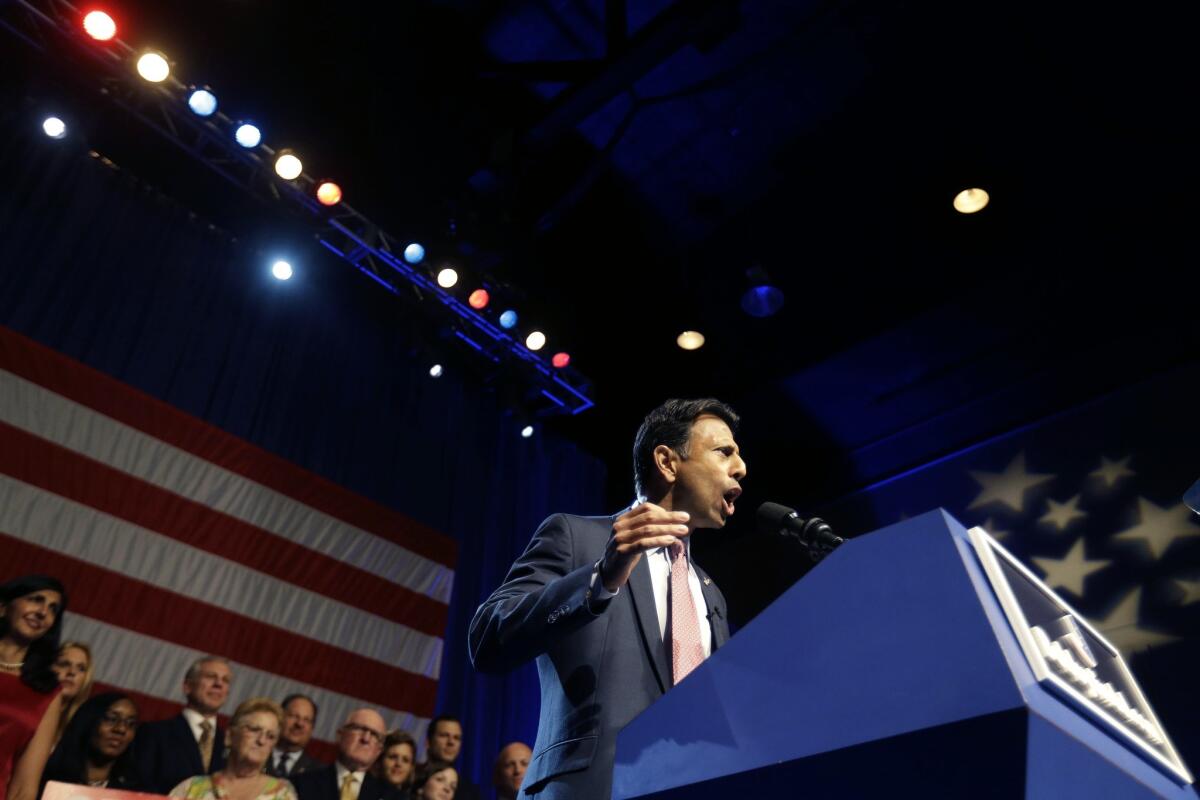Op-Ed: What ‘Let’s be clear’ really means

Louisiana Gov. Bobby Jindal announces his candidacy for President in Kenner, La. on June 24. Jindal is one of many prominent politicians to have recently used the phrase “Let’s be clear” in a speech or essay.
British politicians love the word “clearly.” Whenever one of them begins a sentence with “clearly,” what follows is almost certainly the most debatable and non-obvious point of his or her argument. “Clearly, the Cameron government have made tremendous progress on health and education.” Used in this way, the adverb “clearly” is what modern grammarians call a “sentence adverb.” Rather than modifying a specific verb, it modifies the entire sentence: The truth of this proposition, it says, should be clear to any rational person. Only it isn’t.
Americans use “clearly” in this way too, but we prefer the hortatory imperative: “Let’s be clear.” The phrase is notoriously one of President Obama’s favorites. He uses it as a rhetorical device to change directions — a slightly grander way of saying “but” or “yet” or “still.” Usually he means “Let’s be frank” or “Let’s admit the truth here,” although what follows often isn’t much of an admission.
“Let’s be clear,” he remarked after praising the Supreme Court’s decision to uphold the Affordable Care Act. “We’ve still got work to do to make healthcare in America even better.” How brave of the president to concede this point; don’t anyone get the idea that healthcare in America is perfect.
Sometimes, the president uses the phrase more or less as the British use “clearly”: as a way of daring his listeners to disagree and thus risk the imputation of dishonesty. “Let’s be clear,” he said after the Charleston, S.C., shooting. “At some point, we as a country will have to reckon with the fact that this type of mass violence does not happen in other advanced countries … with this kind of frequency.”
He may have been right or he may have been wrong — it depends on what he meant by “with this kind of frequency” — but his “Let’s be clear” implied that to disagree was deliberately to ignore the truth.
When I worked as a speechwriter for South Carolina Gov. Mark Sanford, I would hear the boss use “Let’s be clear” in a similar sort of way. “Let’s be clear: This isn’t real reform.” I began using it in written products for him — reluctantly at first, but once you start using a phrase like that, you can’t stop. It quickly became an all-purpose intensifier; sometimes, drafting an op-ed, say, I’d just use it to mean “This is the main point of the op-ed.”
In fields other than politics — sports, business — appeals to clarity often precede clear statements. “Let’s be clear: We lost today because we played badly.” In politics, “Let’s be clear” signals opacity ahead.
Jeb Bush, for instance, made a mess for himself when he said he would have, then wouldn’t have, invaded Iraq. “Let’s be clear,” he said — yes, let’s! — “What I said about Iraq is that, in hindsight, based on the faulty intelligence and the security issues, that I wouldn’t have gone in, and my brother concurs.” Right-o.
“Let’s be clear” in political discourse may also mean something like “Let’s vastly overstate our argument and make ourselves feel good about being really, really right.”
Thus Sally Kohn, writing in the Daily Beast after several GOP politicos (Rick Santorum, Sen. Ted Cruz, Mike Huckabee, Rep. Steve King) suggested defying the Supreme Court’s same-sex marriage decision: “Let’s be clear: These are current and former officeholders, who have taken an oath to uphold the laws of our nation, literally pledging to violate those laws as interpreted by the Supreme Court.”
Kohn knows the Supreme Court has been disgracefully wrong in the past and deserved defiance (e.g. Plessy vs. Ferguson). But she didn’t feel the need to explain why this is not one of those times. Instead, she characterized all four men as insurrectionists and suggested that any reluctance to acknowledge their lunacy arises from an aversion to clarity — from a failure to “be clear.”
Louisiana Gov. Bobby Jindal, for his part, thinks clarity will lead to a very different interpretation of the court’s decision. “Let’s be clear,” he wrote in Politico. “Today’s decision will pave the way for an all-out assault against the religious freedom rights of Christians who disagree with it.”
Granted, in the political world, assaults are always “all-out” or “full frontal,” but even so, an “all-out assault against the religious freedom rights of Christians” would mean, at a minimum, forbidding Christians from attending church. I think it will take more than Obergefell vs. Hodges to get us to that point.
Clarity in thought or speech is the absence of confusion, and an entreaty to “be clear” isn’t license to use convoluted logic and slapdash rhetoric. Let’s actually be clear instead of talking about it so much.
Barton Swaim is the author of “The Speechwriter: A Brief Education in Politics.”
Follow the Opinion section on Twitter @latimesopinion and Facebook
More to Read
A cure for the common opinion
Get thought-provoking perspectives with our weekly newsletter.
You may occasionally receive promotional content from the Los Angeles Times.






